After decades of work to reverse the decline in walking and wheeling among students, Green Communities Canada (GCC) received a major financial contribution from the Government of Ontario in 2017 to do this important work on a provincial scale. Thus, the Active & Safe Routes to School program became Ontario Active School Travel (OAST), with the mission to create a culture of active school travel that is safe, easy, and enjoyable for Ontario students.
GCC is thrilled to celebrate the accomplishments of the OAST program over the past five years (2017 – 2022) by reflecting on its collective impact, program highlights, and sharing plans for future programming.
About OAST
There are several core components of OAST, including the fund, council, and network, all of which provide critical support for communities across Ontario.
Fund
A fund was established with the purpose of increasing active school travel opportunities for elementary students. The fund offers grants to school boards, student transportation consortia, as well as municipal and local partners for projects that support active travel.
Council
A council was appointed to bring together key provincial stakeholders to help identify and pursue strategic priorities in pursuit of OAST’s mission. The council is comprised of members representing transportation consortia, school boards, health units, police services, municipalities, and non-profit partners.
Network
The network refers to a community of practitioners working to support active forms of transportation at the local, regional, or provincial level. This community fosters peer-to-peer sharing of information, resources, and strategies to enhance capacity and collective impact. The network is actively engaged through a slack channel, regular emails, and coaching sessions.
In addition, the OAST program leads encouragement campaigns (International Walk to School Month, Winter Walk Day, and Spring into Spring) and pursues special research-based projects (I.e., Skills Training, Policy Recommendations, Parent Engagement, etc.) to further support on-the-ground initiatives.
Collective Impact
Since launching in 2017, the OAST program has accomplished a lot. With partners across the province, we have made a significant impact in 62 communities and have helped secure $5.1 million in funding for school transportation initiatives. Collectively, we have:
- Reached 816,400 students,
- Engaged 1,882 elementary schools,
- Involved 62 communities,
- Led 48 projects,
- Created 233 school travel plans,
- Secured $2.8 million in project grants, and
- Secured $3.3 million in match funding from local partners.
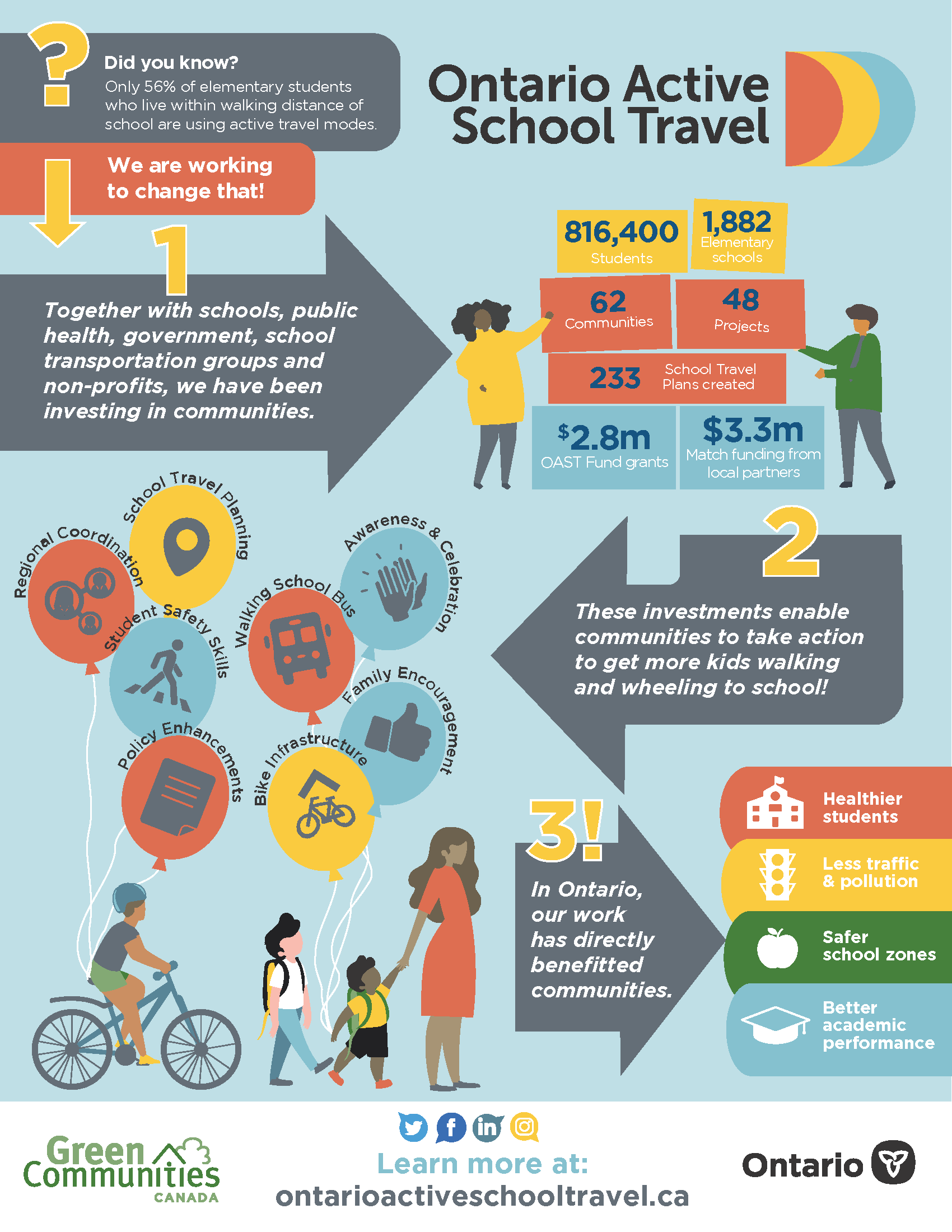
Program Highlights
Since 2017, the OAST program has helped fund and spotlight initiatives that encourage active school travel in local communities. Read along as we reflect on some of the events, projects, people, collaborations, and accomplishments that have made the past five years a booming success!
Events
The OAST Summit in Toronto
In October 2018, 150 delegates across Ontario and beyond joined forces in Toronto to attend the OAST program’s inaugural summit. The summit delegates included representatives from non-profit organizations, municipal transportation and planning, school boards, school communities, provincial organizations, and transportation consortia, to name a few. The full day event incorporated presentations and discussions about encouraging cultures of active school travel, coordinating data collection, creating meaningful parent engagement, effective school site designs, and more. The OAST Summit was the largest gathering of active school champions ever seen in Ontario!

Speakers at the 2018 OAST Summit (Photo by: Green Communities Canada)
The Fill-A-Bike Rack Day in Thunder Bay
One day while sending his two daughters to school, Scott Read, a Thunder Bay-based parent, noticed that the school only had one bike rack. Read decided to raise this matter at the parent council, and suggested the addition of more bike racks, and programming to promote the usage of bike infrastructure. The school, C.D. Howe Public School, partnered with EcoSuperior to put together Fill-A-Bike-Rack-Day. This event saw over 40 young students riding their bikes around the community alongside school staff and parents. The school also created a space for DIY bike repairs and partnered with Community Spokes to provide free bike tune-ups. Overall, this event, championed by one parent, helped encourage a stronger bike culture with the students at C.D. Howe Public School.
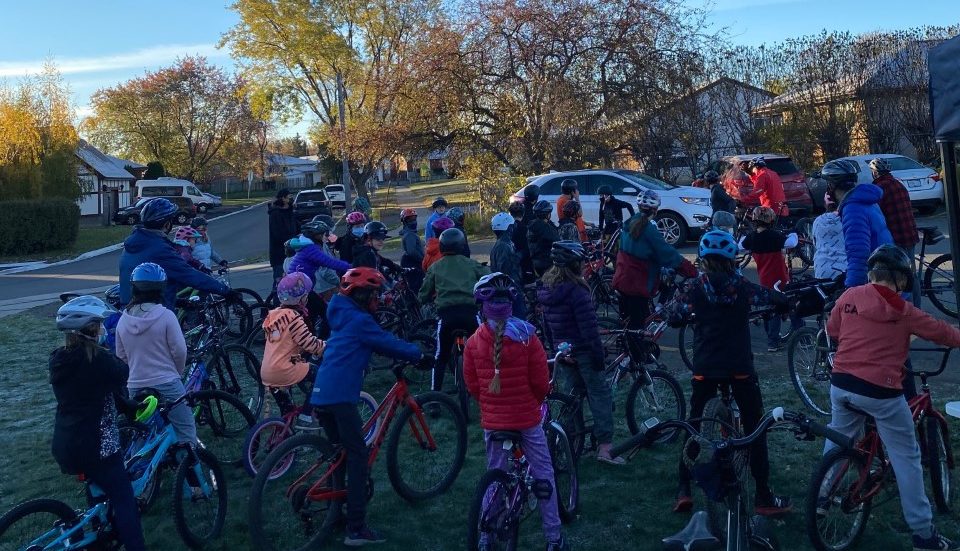
Fill-a-Bike-Rack Day participants in Thunder Bay (Photo by: EcoSuperior)
Infrastructure
Youth-led School Travel Planning in Toronto
The COVID-19 pandemic required creativity and initiative to maintain momentum for active school travel in communities. Our School Travel Planning team in Toronto used the lockdown as an opportunity to encourage students to reflect on and identify changes to improve the urban infrastructure around their schools. During the closures, students walked along the school route in teams, and identified gaps in signage, obstacles on and around footpaths, and unsafe crossroad designs, to name a few. The students presented these findings, with city officials showing strong interest in the initiative. This program highlighted the importance of including children’s voices in the design of the routes to school.
Fun Sidewalk Art in Timiskaming
Another innovative initiative that arose during the pandemic came from the Timiskaming District. When students were not able to use play structures during the initial period of the pandemic, the Timiskaming District added artwork (animal footprint drawings, hopscotch) to the sidewalks to encourage continued active play during children’s commute to school. Using additional funding from OAST, the District pursued School Travel Planning at four local schools. With the City of Temiskaming Shores’ endorsement of the Timiskaming AST Charter, the District now receives long-term support for active school travel initiatives.
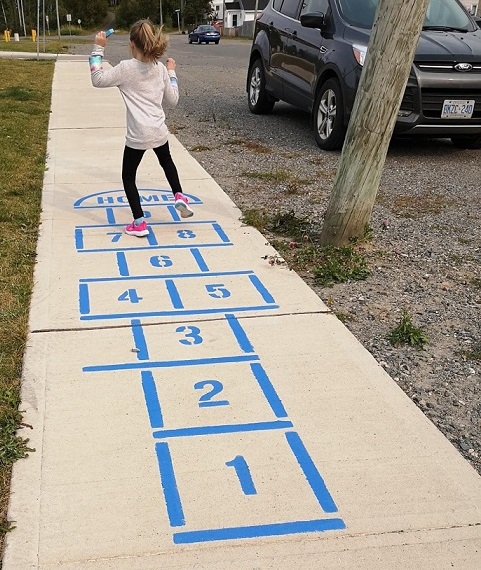
Child playing on sidewalk hopscotch in Timiskaming (Photo by: Timiskaming District)
Infrastructure Improvements in Blind River
The Town of Blind River, with a population size of 3,500, is the smallest community to have benefitted from the OAST Fund. The town had initially utilized the OAST Fund to implement School Travel Planning but pivoted their plans as a result of the COVID-19 pandemic. Blind River focused on implementing infrastructure measures, such as painting pedestrian crosswalks, repairing sidewalks, fencing in a school bus drop-off area, implementing the community’s first ever speed display sign, and adding bike repair stations at three locations across town. These additions provided the community with the foundation necessary to encourage active travel to school upon the return to in-person classes.
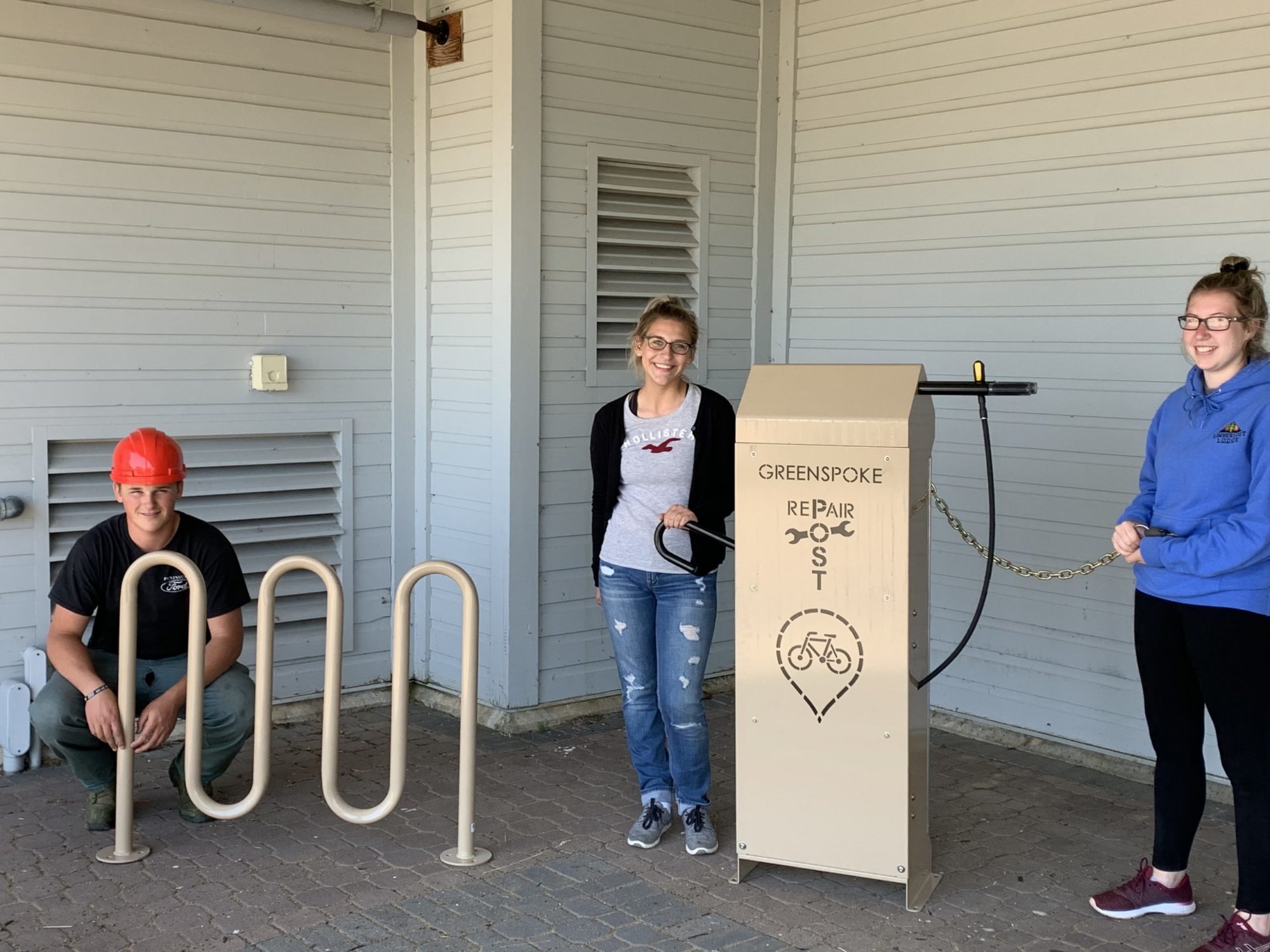
Bike parking and bike repair station (Photo by: Town of Blind River)
Student Champions
Peer-to-Peer “Roll Model” Program in North Bay
In 2019, School Travel Planning surveys at Ecole catholique St-Raymond revealed parents’ desires to improve their children’s cycling skills. For this reason, the school organized a bike safety and skills education program. St-Raymond invited teachers and grade 11 and 12 students from École secondaire catholique Algonquin, an outdoor school, to help teach their students essential cycling skills and safety tips. Parents and students at St-Raymond brought bikes and helmets to school and were challenged to visit a series of cycling skills stations. This peer-to-peer program provided students with the opportunity to share their knowledge and empowered other students to gain independence and confidence on a bicycle.
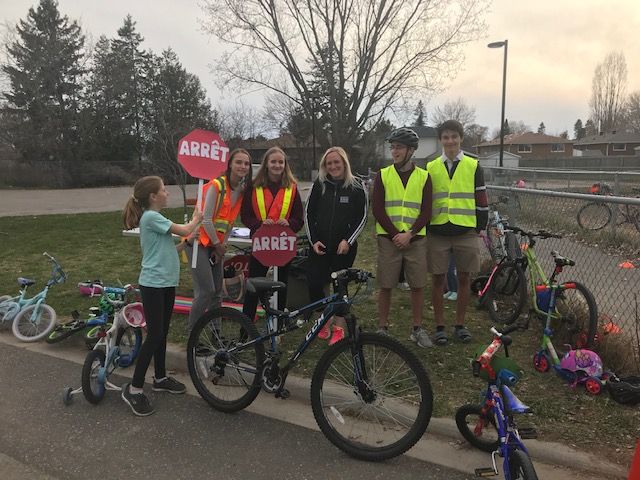
Project lead and youth with bikes in North Bay (Photo by: École Secondaire Catholique Algonquin)
Youth-led Active School Travel Toolkit in Ajax
In October 2022, the Town of Ajax launched the Youth Active School Travel Toolkit, written by Jay Pitter, spearheaded by Armi De Francia, and co-written by a group of youth aged 14 to 16. The toolkit highlights youth voices to address the main challenges associated with creating a culture of active school travel. It includes resources for youth to promote walking and cycling in their communities, and highlights the benefits students receive from walking or wheeling to school. Overall, the toolkit addresses an aspect that many other resources overlooked – acknowledging the importance of incorporating youth voices in the larger discussion about active school travel.

Project leads and youth sitting on steps in Town of Ajax (Photo by: Town of Ajax)
Programming
Hop! App in Ottawa
Ottawa’s EnviroCentre, working alongside the Ottawa Student Transportation Authority (OSTA), created and launched a walk to school app, called Hop!. The Hop! app offers innovative and fun ways to encourage active school travel in local communities. For example, students and families can log trips, track the number of days and distances walked, track their greenhouse gas emissions averted, and more. Users of the Hop! app also had the opportunity to receive awards when they participated in challenges and logged their trips. In 2021, the Hop! app received the Ministry of Transportation’s Road Safety Achievement Award for Initiative of the Year.
Collaboration
Walking & Wheeling Skills Training across Canada
It is estimated that less than 1 per cent of Ontario students currently receive pedestrian and cycling skills training every year. Not only that, but unlike many other provinces, Ontario does not have a province-wide skills training program. For these reasons, OAST partnered with Stuckless Inc. to conduct a best practice audit of programs across the country to provide communities with expert guidance and access to processes and tools for providing skills training programs. The project led to the creation of an online resource hub for individuals to share content on how they support walking and cycling skills training in their communities.

2 Wheelz 4 Realz cycling skills event in Thunder Bay, ON (Photo by: Patrick Chondon via EcoSuperior)
School Streets Pilots Across the GTHA
Between September 2021 and June 2022, GCC partnered with 8 80 Cities to introduce the Ontario School Streets Pilot (OSSP) project in four Ontario cities, including Hamilton, Markham, Mississauga, and Kingston. The School Streets pilots created car-free zones in streets adjacent to schools with the intention to increase active school travel, reduce traffic congestion in the area, and provide a safe and fun place for children to play before and after the school day. Upon completion of the four pilot projects, a summary report on the findings and recommendations was published. There is significant interest in the continuation of School Streets in many of these pilot communities.
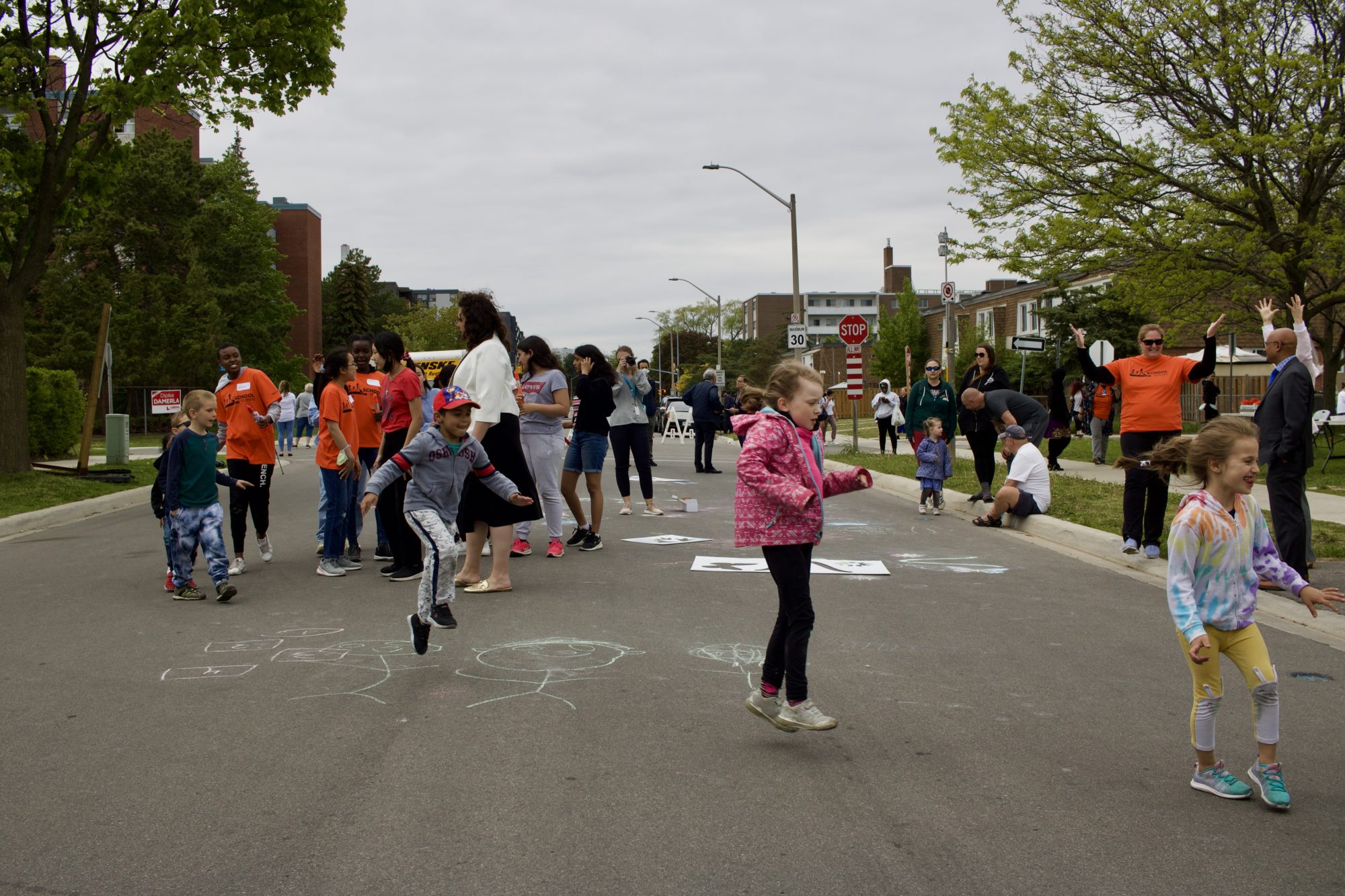
School Streets Pilot project in Mississauga (Photo by: Green Communities Canada)
Active Travel Policy Recommendations Across Ontario
The Human Environments Analysis Laboratory (HEAL) at Western University partnered with GCC to research and develop evidence-based policy recommendations for schools, school boards, municipalities, and the provincial government relating to active school travel. The research identified 57 key recommendations across five themes (Planning, Infrastructure, School Site, Student Transportation, and School Travel Planning). The research team created the report based on a literature review of 185 academic papers, environmental policy scans of 24 Ontario regions, and 555 key informant surveys and interviews. The Centre for Active Transportation (TCAT) joined in the dissemination of these findings, co-hosting a three-part webinar series, and creating advocacy assets to further communicate the findings.
The Discontinuation of OAST
The funding for the OAST program ended in March 2022, and unfortunately, was not renewed. This means that we are no longer able to provide funding directly to communities, facilitate knowledge-sharing activities, lead seasonal event campaigns, coordinate awareness raising programs, or support the development of valuable resources.
“We know that OAST had a meaningful impact in advancing active school travel across Ontario, and we are saddened that we will not be able to continue this important work at the scale we want to,” shared Nicole Roach, Sustainable Transportation Manager at Green Communities Canada. “We will adapt and find new ways to have a positive impact.”
We have worked hard to maintain our online presence and continue delivering services at a baseline level, but in the coming months, we will begin to wind down our OAST activities, such as our websites and social media accounts, to create capacity for other initiatives. Our key resources will still be made available through our GCC website, the OAST Network Slack channel will remain, and we will continue to share updates via GCC’s social media channels.
Future Impact
Based on the positive impact of the OAST model, GCC is eager to continue working with communities across Ontario and Canada to support active and sustainable school journeys. We hope to do this in the following ways:
- Secure multi-year funding commitments for long-term planning and momentum building, with the goal of supporting internal capacity and distributing funds to community-led initiatives
- Build on the key focus areas of OAST for national expansion, including School Streets, Skills Training, Behaviour Change Strategies, and School Travel Planning
- Continue working with stakeholders across the country as part of the Active School Travel Canada Working Group
- Support the transition towards electric school buses as part of the Canadian Electric School Bus Alliance
- Develop and improve tools to collect, analyze, and report on school travel trends across local, regional, and provincial jurisdictions
- Identify opportunities for implementation of evidence-based policy recommendations to support AST
“We are excited and optimistic for the next phase of work within our Sustainable Transportation team,” said Brianna Salmon, Executive Director of Green Communities Canada. “There are many exciting opportunities on the horizon for us to do this work on a larger scale, and have an impact in new, innovative ways.”
Acknowledgments
In celebrating the success of OAST, we would also like to recognize the many funders, partners, and supporters who made it all possible.
Funding
Thank you to the Government of Ontario, Heart & Stroke Foundation, CAA, RIO CAN, Metrolinx, Ontario Traffic Council, Toronto District School Board, and Toronto Catholic District School Board for providing financial support.
Partnerships
A big thank you to the partners who collaborated on projects, programming, and initiatives, including, Heart & Stroke Foundation, Canadian Automobile Association – South Central Ontario, Metrolinx, Ottawa Student Transportation Authority, Ontario Ministry of Education, 8 80 Cities, The Centre for Active Transportation, Human Environments Analysis Lab, Cycle Toronto, CultureLink Settlement and Community Services, OPHEA, EcoSchools Canada, and Canadian Cancer Society.
Support
Another big thank you to the organizations that we worked alongside to further active school travel across Canada, including Active School Travel Canada, Ecology Action Centre, Vélo Québec, Green Action Centre, Saskatchewan in Motion, SHAPE, Active for Life, and BC Healthy Communities.
“We have thoroughly enjoyed developing and leading the OAST program. We sincerely thank everyone who has supported this work or participated in our initiatives,” concludes Roach. “We look forward to working with all of you again soon.”
Written with significant contributions from Nicole Roach.
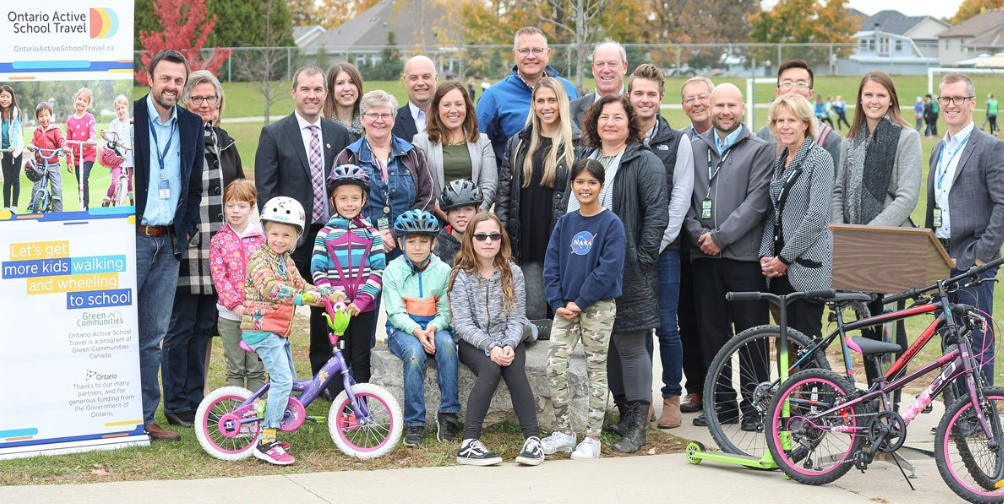
Recent Comments